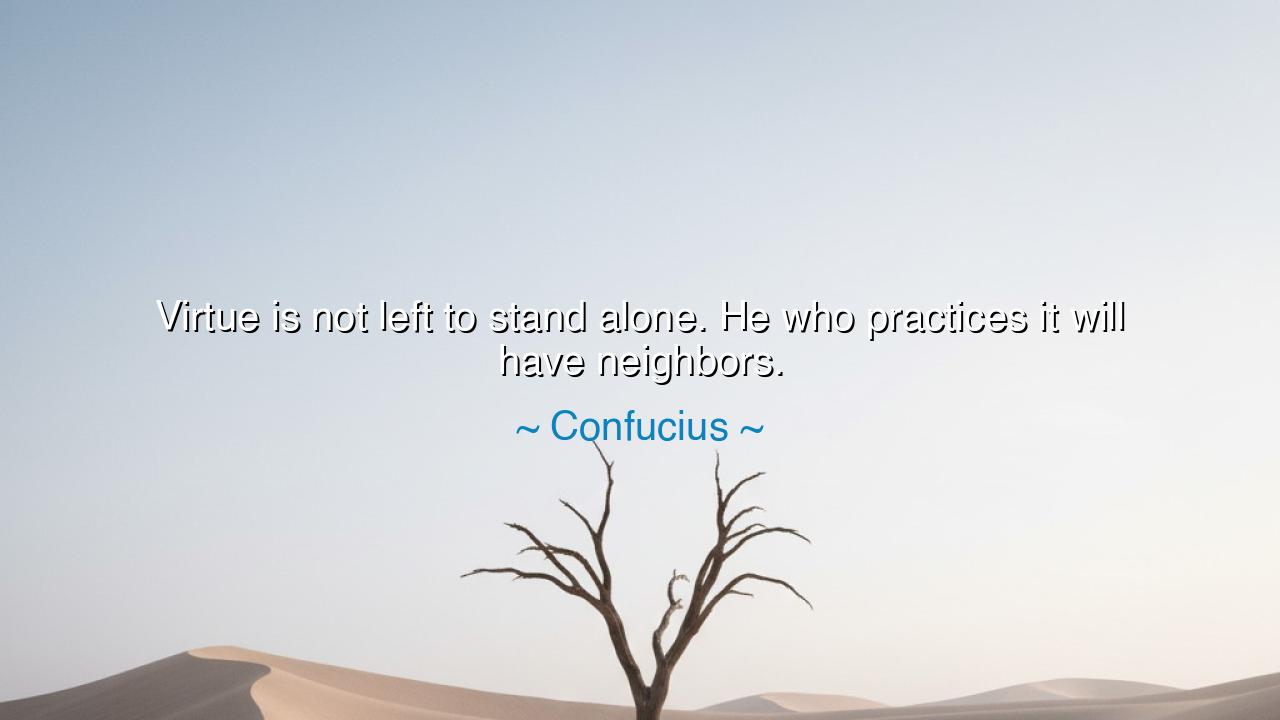
Virtue is not left to stand alone. He who practices it will have






In the great cycle of life, where each action ripples through the fabric of the world, Confucius imparts a timeless truth: “Virtue is not left to stand alone. He who practices it will have neighbors.” These words speak to the very heart of what it means to live a virtuous life, one not isolated from the world, but deeply connected to it. Virtue, as Confucius teaches, is not an abstract concept, but a living force, one that reaches out to others, inviting them into its embrace. To practice virtue is to sow seeds that, over time, grow into relationships, communities, and a network of connections rooted in goodness and integrity.
The ancient philosophers, like Socrates, understood this deeply. For Socrates, virtue was not a solitary pursuit, but something that was shared and cultivated through conversation and dialogue. His belief that the unexamined life was not worth living emphasizes that the virtuous individual is always in relationship with others. Virtue is shaped through interaction, through challenging and supporting one another. Just as a tree cannot grow without soil, water, and air, so too does virtue depend on the presence and support of others. It is in community that virtue flourishes and becomes something greater than the individual.
In the life of Gandhi, we see this profound truth in action. Mahatma Gandhi was a man of unparalleled virtue, driven by the principles of truth, nonviolence, and self-discipline. Yet, his virtue was not something that he kept to himself. It was a light that shone outward, drawing others to him, and forming a vast network of followers who sought to embody his principles. Gandhi’s life demonstrates how virtue naturally attracts others, how the practice of good deeds and ethical living creates connections that transcend the individual. In his movement for Indian independence, it was not just his personal virtue that led to success but the community that rallied around his ideals, united by a shared commitment to justice and peace.
Consider also the story of Nelson Mandela, a man who spent decades in prison not only for his personal beliefs, but for the freedom and dignity of others. His virtue—his commitment to equality, forgiveness, and unity—inspired a nation and the world. Mandela did not stand alone in his struggle; he was surrounded by fellow activists, by a movement, by a people who were moved by his example. His virtue brought him neighbors, both in his physical struggle and in the global community that rallied behind him. Through his life, we see that virtue is never solitary; it grows and spreads through connection and collaboration.
Confucius’s teaching also reminds us that virtue is a magnetic force. It attracts others not because it seeks recognition, but because it is aligned with the deepest truths of human existence. Virtue has a quiet power, one that does not demand attention, but that calls out to others through its sincerity. Those who practice virtue draw others near, and in this way, they create a community of like-minded individuals, bound together not by the pursuit of power or wealth, but by a shared commitment to goodness and right action. The presence of virtue transforms not just the individual, but the society they live in.
The lesson we take from Confucius’s words is clear: to live virtuously is to live in relationship with others. Virtue is not something we keep locked within ourselves, but something we share with the world. When we choose to live by the principles of integrity, honesty, and compassion, we naturally draw others to us, and together, we build communities of purpose and strength. The more we practice virtue, the more we build the very fabric of the world we wish to see—a world of kindness, fairness, and love.
Let us take action: In our daily lives, let us embody the virtue that we wish to see in others. Let us live with integrity, treating others with respect and honor, knowing that our actions, no matter how small, have the power to create connections and change. As we practice virtue, let us remember that it is not for our benefit alone, but for the good of the world around us. By living virtuously, we invite others to join us on a path of shared goodness, and together, we will create communities where virtue stands at the heart of all that we do.






AAdministratorAdministrator
Welcome, honored guests. Please leave a comment, we will respond soon